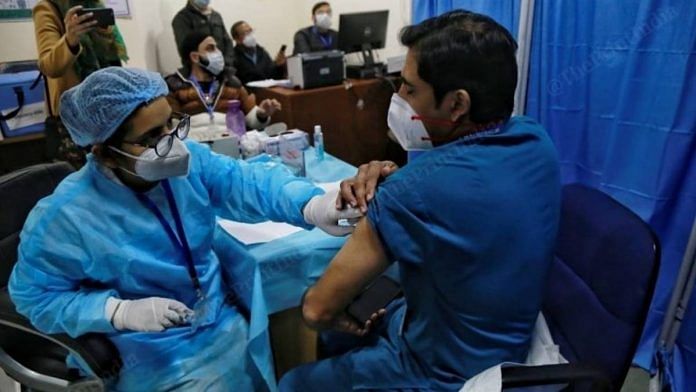Hyderabad: Thirty per cent people lose vaccine-induced immunity against Covid-19 six months after vaccination, shows a study by Hyderabad’s AIG Hospitals, conducted in collaboration with the Asian Health Foundation, an institute based in the same city.
The study, which is yet to be peer-reviewed, was conducted on 1,636 fully-vaccinated healthcare workers. It found that 30 per cent of the participants reported immunity levels below the minimum threshold (100 AU/ml) — making them susceptible to a Covid infection, the hospital said in a statement Wednesday.
The statement didn’t elaborate on the results for the remaining 70 per cent, but D. Nageshwar Reddy, AIG Hospitals Chairman, was quoted as saying that the “nine-month gap for prevention dose benefits 70 per cent of the population who can retain enough antibody levels beyond 6 months”.
While the majority of those who lost immunity were reported to be above the age of 40 and had comorbidities such as diabetes and hypertension, about 6 per cent didn’t develop any immunity at all. The majority of these were also above 40 and had comorbidities, the study noted.
Of those studied, 52 per cent were male with a median age of 29. While 93 per cent had received Covishield, 6.2 per cent had taken Covaxin, and less than 1 per cent Sputnik. About 12 per cent had a prior history of Covid infection, and nearly 3 per cent of the individuals had diabetes and hypertension, the statement said.
Researchers involved in the study measured the IgG anti-S1 and IgG anti-S2 antibodies to SARS-CoV-2 in the 1,636 individuals. It was estimated that an antibody level of 100 AU/ml is the minimum for protection against Covid, said D. Nageshwar Reddy in the statement.
According to the study, 6 per cent (98 individuals) reported S1/S2 spike-neutralising antibodies in the negative range (15 AU/ml), six months after the second dose of vaccination. Of these 98, 57.14 per cent were male.
“Our study results were at par with other global studies where we found that almost 30 per cent of individuals had antibody levels below the protective immunity level of 100 AU/ml after 6 months. These individuals were majorly above 40 years with co-morbidities like hypertension and diabetes. Out of the total, 6 per cent did not develop any immune protection at all,” Reddy said.
The study results indicated that immunity waning is directly proportional to age, suggesting that younger people have more sustained antibody levels than the elderly population.
It also showed that people above 40 with comorbidities like hypertension and diabetes have significantly less antibody response after six months of second dose. Therefore, they must be prioritised for a booster dose, Reddy said.
Also read: Covid booster dose offers effective antibody protection against Omicron, Lancet study finds
Immunity waning linked to age, comorbidities
According to the study, a comparison in individuals who reported antibodies below the detectable range (negative range) and those who reported antibodies below the minimum protection range, revealed that vaccine immunity waned with increase in age.
For instance, around 28.8 per cent of individuals in the age group of 18-39 reported antibodies below minimum range, whereas the figure was 30.7 per cent for individuals between 40-59.
“At present, the nine-month gap for prevention dose benefits 70 per cent of the population who can retain enough antibody levels beyond 6 months. However, considering the scale of our country, the 30 per cent of people, especially those with comorbid conditions like hypertension, diabetes, etc, who are more prone to develop an infection after 6 months of getting fully vaccinated should also be considered for the prevention dose,” Reddy said in the statement.
While immunity isn’t just limited to the presence of antibodies but also includes T-cells, memory cells etc, the study was designed to check the humoral immune response, i.e, antibody levels that are the first line of defence.
“In that too, we studied specifically for the S1/S2 spike neutralising antibodies which are supposed to kill the virus. Theoretically, people who are unable to generate enough antibodies after vaccination because of their age or comorbid conditions will also have a lower T-cell response,” Reddy told ThePrint when asked about the methodology.
(Edited by Amit Upadhyaya)
Also read: Did your child test positive for Covid? Doctors say don’t worry, most kids recover in 3-4 days



